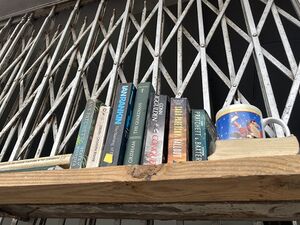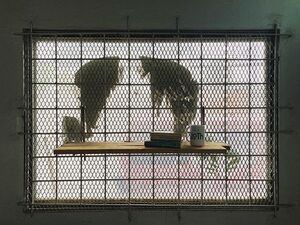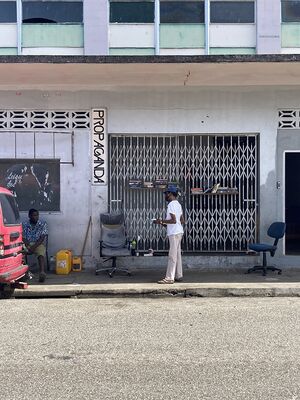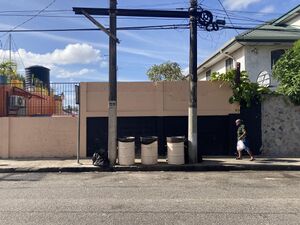Jumbie Library
Jumbie Library is a shelf in a Mas camp. It is an analog and digital library maintained by the collective Alice Yard (https://aliceyard.blogspot.com/), in Belmont, Port of Spain, Trinidad and Tobago.
It was initiated by one of the collective members, Kriston Chen, as a pavement project with the local community. Temporary shelves are installed inside and outside the front gallery, and stocked with donated books. Neighbours and pedestrians are invited to pick up and leave books, or stay for coffee and read.
Kriston describes the library:
In keeping with the values of our space — sharing, relationships, collaboration, play — the library was formed in hope to re-introduce a semblance of a reading space in Belmont, Port of Spain — an historical neighbourhood with a widening literacy and cultural gap between old and young generations. In addition, there is a riso printer available to collaborate with writers and artists.
During the workshop series Parallel Library Services, the Jumbie Library was extended to include a digital library running on Bibliotecha. The appeal of using Bibliotecha was to maintain the locality of the original project while sharing digital texts. Readers can browse, download, and upload texts here.
...
The term jumbie can mean, to just appear. It also refers to spirits or what once was. The Jumbie Library harks back to neighbourhood libraries that existed in Belmont, decades ago. The Jumbie Library appears today in response to a community need for reading. The sustained interest in Mas, a local form of Carnival, provides a diverse readership that values both community and arts. The library is inspired by the Jumbie Bin project, a 'blocko' response to garbage disposal using easy to find oil drums — in collaboration with neighbours and garbage collectors.
The Jumbie Library explores questions like:
What is the relationship between publishing and Mas? How does publishing change Mas? How does Mas-making keep going? What are the tools for working with Mas?




